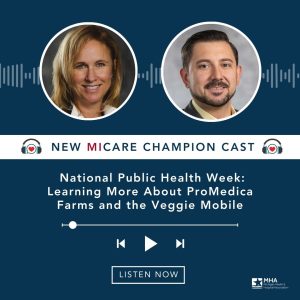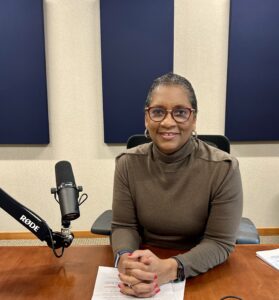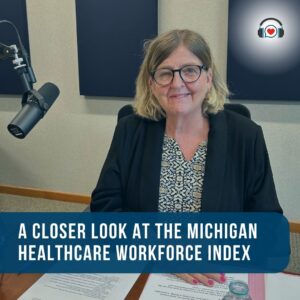
 The MHA released a new episode of the MiCare Champion Cast during National Public Health Week to explore how hospitals are engaged in public health. Featured guests include Julie Yaroch, D.O., president of ProMedica Charles and Virginia Hickman Hospital and senior vice president of ProMedica Inpatient and Retail Pharmacy, and Frank Nagle, MBA, director of Community Impact in Michigan at ProMedica.
The MHA released a new episode of the MiCare Champion Cast during National Public Health Week to explore how hospitals are engaged in public health. Featured guests include Julie Yaroch, D.O., president of ProMedica Charles and Virginia Hickman Hospital and senior vice president of ProMedica Inpatient and Retail Pharmacy, and Frank Nagle, MBA, director of Community Impact in Michigan at ProMedica.
One of the public health issues that continues to be a priority for Michigan hospitals and health systems is food insecurity. With this in mind, Yaroch and Nagle highlight the strong impact the ProMedica Farms and Veggie Mobile are having on residents and communities by improving access to fresh, affordable produce and nutrition education.
Located on the hospital campus, ProMedica Farms includes a hoop house, outdoor garden, education center, walking trails and playground, all of which are open to the community. The Veggie Mobile, which has served 50,000 residents since 2013, is a market on wheels that travels to 17 locations throughout Lenawee County to offer residents an assortment of fresh, low-cost produce. ProMedica received a Ludwig Community Benefit award for both initiatives in 2023, which is presented annually to MHA-member organizations integrally involved in collaborative programs to improve the health and well-being of area residents.
In the episode, Yaroch and Nagle share how these efforts began while highlighting the important role hospitals play in public health alongside government agencies, educational institutions and the community.
“When you go back in history, public and medical health used to be under the same roof,” said Yaroch, who serves as current chair of the MHA Public Health Task Force. “We just need to dust things off and remember the importance of coming together preventatively rather than reactively. We need to continue to have those relationships and touch bases so that we understand each other’s role and have trust.”
Born out of a partnership with Lenawee Health Network, both the Farms and Veggie Mobile were implemented over the course of 10 years following a community health needs assessment that screens social determinants of health and identifies areas of vulnerability.
“It started small and really grew just by raising awareness, forming connections and responding to community and patient needs,” said Yaroch. As efforts expand, Nagle noted that the goal is to have these models replicated to serve communities across the country.
Both the Farms and the Veggie Mobile have had significant impact since their start. In 2011, about 5% of adults reported eating the recommended servings of fruits and vegetables. In 2022, that increased to 21%. Yaroch noted that “getting outside of the four walls of your operation” is key to making public health efforts successful.
“Really take the time to ask, what can we do better?” said Nagle. “Let’s get to the root cause of these barriers and make informed and data-driven decisions with community member input that help overcome those.”
Additional results from the Farms and Veggie Mobile collected by the hospital, include:
- 7,300 pounds (more than three tons) of produce harvested since 2018.
- 13,626 pounds (seven tons) of produce donated and distributed to the community since 2018 from the Farm, Gus Harrison Correctional Facility and local farmers.
- 100 gardening, nutrition and cooking workshops have served nearly 500 community members since 2018 from the Farm and Michigan State University Extension.
- 340+ patients screened for food insecurity who received food at discharge or at their primary care provider’s office.
The episode is available to stream on Spotify, YouTube, Apple Podcasts and SoundCloud. Those interested in learning more can visit the ProMedica Farms and Veggie Mobile websites. To get involved or learn more about the MHA Public Health Task Force, contact Lauren LaPine at the MHA. To nominate a hospital or health system for future Ludwig Community Benefit awards, visit the MHA website.
Questions or idea submissions for future MiCare Champion Cast episodes can be sent to Lucy Ciaramitaro at the MHA.









